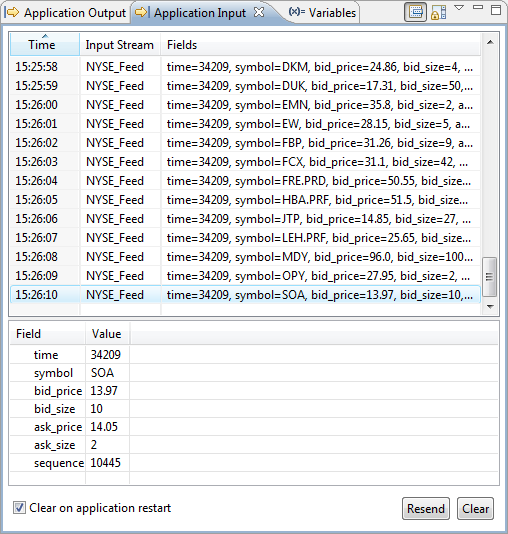The Application Input view allows you to see what tuples have been sent to the running application via the Manual Input View or Feed Simulations View. The Application Input view works much like the Application Output View.
By default, the Application Input view is located in the lower left corner of the SB Test/Debug perspective.
The figure below shows an Application Input view that has logged several tuples sent through the Best Bids and Asks sample application.
 |
The button is disabled by default. To enable the button, select one or more rows, including a noncontiguous selection of rows made by holding down the Ctrl key while selecting. When enabled, the button sends the selected tuples back to the input stream named in the second column of the Application Input grid.
The Application Input view is cleared by default whenever you restart an application, but you can change this by clearing the Clear on Application Restart check box.
The Application Input and Output views each have an associated preference, Tuple Buffer Size, which specifies how many tuples are shown in each view before scrolling out of the buffer. The default buffer size is 400 tuples. You can change the default by selecting → and opening the → panel.
-
You can sort the tuples in the Application Input view by clicking the heading that corresponds to the way you want to sort (Time, Input Stream, or Fields), or by using the drop-down menu on the view's toolbar to select one of these options.
-
The Show Details Pane can help you read output data that is too long to easily see in the Application Input table.
-
Click the
 Show Details Pane button to display or hide the Show Details Pane (displayed by default) below the table.
Show Details Pane button to display or hide the Show Details Pane (displayed by default) below the table.
-
Select any row in the Application Input table to display its field values in the Show Details Pane.
-
-
The Scroll Lock button is a toggle that allows you to control how tuples scroll in the Application Input grid:
-
When Scroll Lock is off: as tuple rows are added to the top of the table, the bottom of the table (containing the first tuples) remains visible; you must scroll up to see newer tuples.
-
When Scroll Lock is on: as rows are added to the top of the table, the top of the table (containing the most recent tuples) remains visible; you must scroll down to see older tuples.
-
-
You can right-click any selection of rows in the view to show the context menu, which has the same features as the Application Output view: Show Time column, Copy, and various Copy as options. See Show or Suppress the Time Column and Copy Tuples to Clipboard.
